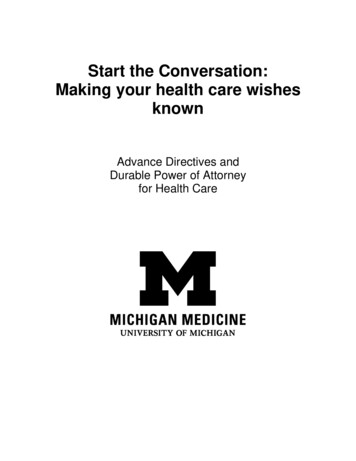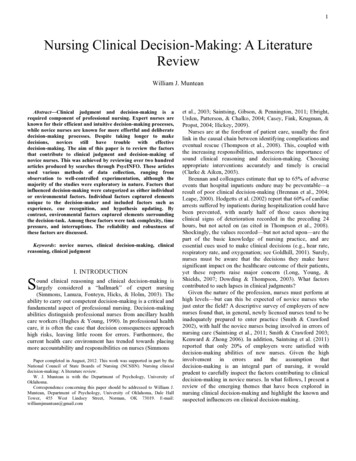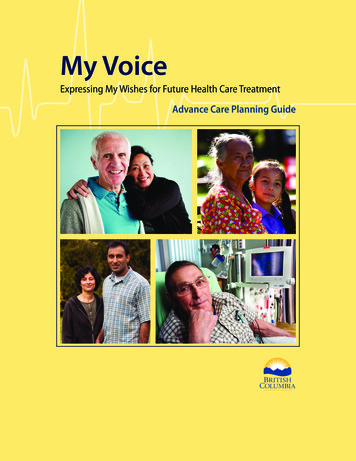
Transcription
Advance Health Care Planning:Making Your Wishes KnownMC2107-14rev0813
What’s InsideWhy Health Care Planning Is Important . 2What You Can Do . 4Work through the advance health care planning process . 4Move past barriers . 5Advance Health Care Directives . 6Advance health care planning . 6Reasons for an advance health care directive . 7Choosing Your Health Care Agent . 8How to choose your health care agent . 9Stating Your Values and Health Care Goals . 10My Values and Health Care Goals worksheet .11Making Your Treatment Choices . 13Common life-support treatment choices .13Other choices you can make .16My Treatment Choices worksheet .17Sharing Your Wishes and Choices . 21Putting Your Wishes in Writing . 22Reviewing Your Advance Health Care Directive . 23A Final Word . 24For more information . 241
Why Health Care Planning Is ImportantSarah was 58 years old when she had a large stroke. Suddenly, shecould not speak or move half of her body. She was rushed to thehospital in an ambulance.When her family got to the hospital’s intensive care unit, they foundSarah attached to a large breathing machine. She could not talk.She did not recognize her family. The physicians and nurses askedher husband and children whether Sarah had ever told them abouther medical care wishes. Sarah’s family had never thought to talkabout this.What would happen if you had a serious accident or illness that left youunable to make decisions or speak for yourself? Your family or otherdecision maker and your health care providers may not know what kindof medical care you want. An advance health care directive is a powerfultool you can use to make your wishes known.You do not have to make an advance health care directive. You getmedical care even if you do not have this kind of directive.However, an advance health care directive speaks for you when youcannot speak for yourself. In your directive, you can: Name someone to make medical decisions for you when you cannot orchoose not to do so. Make known the medical treatments you do and do not want to have. Do both of these things.2
Advance health care directives are not just for older adults. Events you donot expect can happen at any age. It is important for all adults to have anadvance health care directive.This booklet can help you prepare an advance health care directive. Fillingout the actual form is important. However, your most important taskis to work though the material in this booklet and talk about it withthose close to you. After you read this booklet, talk with your health careprovider if you have questions or want more information.Note: This booklet does not talk about mental health advance directives. Talk withyour health care provider if you want to prepare that kind of directive.3
What You Can DoWork through the advance health care planning processAdvance health care planning is a process with a number of steps. Writingan advance health care directive is just one step. This booklet guides youand those close to you through the planning process. Check off each stepwhen you finish it. Learn why advance health care directives are important. Think about who you want to make health care decisions for you. Think about your values and health care goals. Think about what medical treatments you do and do not want. Share your values, goals and choices with those close to you and withyour health care agent and health care providers. Write your advance health care directive. Follow your state’ssignature and witnessing laws. Review your advance health care directive often.4
Move past barriersIt is easy to put off advance health care planning. Most people find it hardto think about the end of life or the chance of a serious illness or injury.Maybe you have had some of these thoughts: I’m healthy so I don’t need an advance health care directive. Thebest time to think about your health care goals and values is when youare healthy and can make your own decisions. You probably havethought ahead and made choices about other parts of your life. Forexample, you may have done retirement, education or estate planning.You have made choices about your job and your home. It is just asimportant to plan for your future health care needs. I’m too young for an advance health care directive. Life can changein an instant. Anyone can have a serious injury from a car accident,sports injury or fall. Even young adults may face a serious medicalcondition where they cannot choose their treatment. Those close to me know what I would choose. This may be true ifyou have talked with them about your health care goals and wishes.Otherwise, do not think your family members and friends know whatyou do and do not want. Without a clear statement from you, thoseclose to you must make their best guess about your medical carechoices during a very stressful time. My doctor knows what’s best for me. There may be more thanone way to treat an injury or illness. In that case, your health careproviders cannot make the choice for you. While an advance directiveis not the same as a medical order, it gives your providers insight intoyour goals and wishes. I do not know what I would want. Use the tools in this booklet toidentify your goals and values and find out what is important to you.You also may want to talk with your health care provider about yourcurrent health and advance health care planning. It’s too hard to prepare an advance health care directive. Most stateshave fairly simple rules about how to make this kind of documentvalid.5
Advance Health Care DirectivesIn all states, you have the right to accept or refuse some or all medical care.If you cannot think or speak for yourself, someone close to you, such asa spouse, an adult relative or a good friend, will be asked to help makehealth care decisions for you.You also have the right to say in writing what kind of medical care youwant and who can make decisions for you. You can do this with anadvance health care directive. It is used only if you cannot make decisionsor speak for yourself or if you choose not to take part in your health caredecisions.Advance health care planningAdvance health care planning is more than simply filling out a form. Itis a process in which you think about your values and health care goals.You decide what kind of medical care you want based on your goals andvalues. It is best to work through the process with the people you trust,such as your family, friends and health care providers.When you are ready to put your thoughts and choices in writing, theactual form you fill out is called an advance health care directive. Thisdocument is used only if you cannot speak or make decisions for yourself.Your advance health care directivemay do one or both of the following: Name a person, called a health careagent or proxy, to make decisionsfor you when you cannot or choosenot to do so. This is sometimescalled a “power of attorney forhealth care.” State specific medical treatmentsyou do and do not want. Thesekinds of instructions are sometimescalled a “living will.”6
Reasons for an advance health care directiveAn advance health care directive is a gift to your family and friends. Ifyou do not have one and cannot say what you want done, your health careproviders will turn to those close to you for guidance. Being asked tomake medical decisions for someone else can cause a lot of stress. Studieshave shown that most family members do not know what kind of caretheir loved ones would want at the end of life.An advance directive can lessen the stress your family may feel aboutmaking decisions for you. It limits confusion. It frees those close to youfrom trying to guess what you would want and helps them agree on yourcare.An advance health care directive contains useful information aboutwhat you value and what is important to you. It states your plan formedical choices if you cannot choose for yourself in the future. Thiscan help guide your health care providers when they make treatmentrecommendations for you.It can be especially important to name a health care agent. If you havenot named a health care agent and those close to you cannot agree aboutyour treatments, a court may need to appoint someone to make medicalchoices for you. This person is called a guardian.If this happens, you have no control over who the court appoints. Andyou cannot be sure the medical decisions are what you would want. Inaddition, court proceedings can be costly. You can help to prevent thisby naming a health care agent in your advance directive. This personbecomes the first person the court would appoint.Even if those close to you agree about the kind of care you want, theymight not be available when a health care decision must be made for you.If that happens, your health care providers can use your advance directiveto guide their actions.However, an advance directive cannot serve as a command. Your healthcare providers will try to follow your wishes, but an advance directive isnot a medical order.7
Choosing Your Health Care AgentAn advance health care directive cannot cover every possible event. Ifyou are not able to make or state your own decisions, your health careproviders will talk with those close to you. However, sometimes thosemay not be the people you would have chosen to make decisions for you.Therefore, it is important to think about naming a health care agent.Choosing someone to act as your health care agent can be the mostimportant part of your planning. Your agent makes medical decisions foryou when you cannot or choose not to do so. Your agent uses what yousay in your advance health care directive as a guide. In situations thatyour directive does not cover, your agent can decide what should be done.Your agent does not have to be a family member. Do not pick someoneout of feelings of guilt or duty. You may want your health care agent to bedifferent from the person you choose to handle your finances. It may helpif the person lives nearby, but he or she does not have to. You also maywant to name an alternate agent in case your primary agent is not willingor able to act or cannot be reached.Your agent must be at least 18 years old. Usually, you cannot name yourhealth care provider as your agent.Before you name a health care agent in your advance health caredirective, talk with him or her: Talk about what is important to you. Use the worksheets in thisbooklet to guide your conversations. Show your advance health caredirective to your agent. Talk aboutyour health care choices. Talkabout any limits you placed onwhat your agent can decide. Make sure your agent will honoryour choices even in hard orstressful situations. Make sure your agent will act basedon what you want, even if othersclose to you want something else.8
How to choose your health care agentUse the following chart to think about who you would trust to makemedical decisions for you. At the top of each column, write the names ofpeople you might ask to be your agent. Check the boxes under each person’sname if a statement is true about him or her.Who I mayask to be myagent.This person:(name)(name)(name)Is over age 18.Knows me well.Is easy to talk toabout my healthcare goals.Understandsand will honormy wishes.Will speak upfor what I wantrather than whatother peoplewant.Can make harddecisions.Is willing to bemy agent.Is readilyavailable inperson or byphone.9
Stating Your Values and Health Care GoalsBefore you start to write an advance health care directive, take time tothink about your values and health care goals. This is a key step. Yourexperiences, values and beliefs about life and death affect your treatmentchoices. Knowing what is important to you can help you and othersdecide what kind of medical care you would want in a serious or lifethreatening situation.What is most important to you? What makes your life worth living?Examples might include your family and friends, hobbies, faith tradition, andthe ability to live on your own.Reflect on your life events, family and cultural traditions, and spiritualbeliefs. Think about experiences you or those close to you have had withserious illness or injury.Consider your feelings and beliefs about quality of life. For example,imagine you have a serious illness or injury that is not likely to get better.Are there certain symptoms or situations that seem worse to you thandying? If so, your health care providers and others who care for you needto know this.10
The following worksheet can help you state what is important to you.Take your time and think carefully about each section. You do not have tofinish the whole worksheet at one time.After you fill out the worksheet, share it with those close to you andwith your health care agent and health care providers. If you want thisinformation to be part of your advance directive, you must include it inyour directive.Your opinions and choices may change over time. Be sure to review andupdate this worksheet often.My Values and Health Care Goals worksheetI want my health care agent, health care providers and those close to me toknow these things about me. I want them to use this information to helpthem decide about my health care.What is most important to meThese things give me joy and purpose. They make my life worth living:I have these concerns or fears about medical treatment:11
My feelings and thoughts about quality of lifeInstructions: Put a check next to each statement if you agree. Cross out thestatement if you do not agree.I feel my life would no longer be worth living if I have a serious illness orinjury that cannot be cured and will be in the following situation(s) for therest of my life: I cannot think clearly or make my own decisions. I cannot understand what others say or interact with others in ameaningful way. I cannot recognize my family and friends. I cannot feed, bathe or take care of myself. I cannot walk. I cannot control my bladder or bowels. I have severe pain almost all the time and need medicine thatmakes me think less clearly, and there is little chance that this willimprove. I have other severe symptoms almost all the time, for example,nausea or trouble breathing, and there is little chance that this willimprove. I must use machines to stay alive and there is little chance that thiswill improve. I need to live in a nursing home or assisted-care facility. I can no longer do these activities:OR I feel my life is always worth living no matter what I can or cannot door how sick I may be.12
Making Your Treatment ChoicesMany medical treatments may be offered to help save or prolong yourlife if you are in critical condition. Examples include breathing machines,feeding or fluids through tubes, and attempts to restart your heart. Otherexamples include surgery, kidney dialysis, devices to help your heart work,medicine to fight infections, and blood transfusions.Most medical treatments can be tried for a while and then stopped if theydo not help. Your health care providers will try to lessen your pain andkeep you comfortable in all situations.Talk with your primary health care provider. He or she can help answerquestions about specific treatments including the risks, benefits and otherpossible treatment options. Your provider can identify other issues tothink about and clarify things that are unclear.Also talk with your family members and health care agent about the kindof treatments you do and do not want.Common life-support treatment choicesCertain treatments and procedures often are used at the end of life or forserious conditions such as a coma from which you probably will not recover.The following chart talks about some of these treatments. Ask your healthcare provider to tell you more about these and other life-support measures.13
Treatment orprocedureWhy it’sdoneHow it’s doneHow it mayaffect youCardiopulmonary Tries to Health care After CPR, youresuscitation, or restart aproviders pressmay need to beCPRnormalvery hard onon a breathingheartbeat ifyour chestmachine.your heartmany times The success ofstops beatingand try to blowCPR dependsor beats veryair into youron factorsirregularlylungs.such as yourand your They mayage, medicalbreathingplace a tube incondition andstops.your throat tohow long yourget air to yourheart was notlungs.beating beforeCPR began. Sometimesthey give anelectric shockto your heart.Breathingmachine, orventilator Can causeinjuries suchas bruises orbroken ribs.Gives oxygen A tube is You may notto your lungsplaced throughbe able to talkif you stopyour mouth,while you arebreathing ornose or anon a breathingare too ill toincision at themachine.breathe wellbase of your You may needon your own.neck.a breathing The tube goesdown yourwindpipeand into yourlungs. The tubeconnects to amachine calleda ventilator orrespirator.14machine for ashort time orlong term.
Treatment orprocedureWhy it’sdoneHow it’s doneHow it mayaffect youTube feedingGives youfluids andnutrients inliquid formwhen youcannot chewor swallow. A tube isplaced thoughyour nose,mouth orabdominalwall and intoyour stomach. You may needtube feedingfor a short timeor long term.Takes outwaste andextra fluidfrom yourblood if yourkidneys stopworking. A tube isplaced into avein.Kidney dialysis You cannottaste the liquidnutrients. You may needto have dialysisseveral times aweek. The tubeconnects to a Each sessionmachine thatmay take a fewremoves wastehours.and extra fluid You may needfrom yourdialysis for ablood and thenshort time orreturns thelong term.blood to yourbody.Think about whether you would want any of these treatments. If so,when and for how long would you want to have them? Some people wantto have all efforts to prolong life made on their behalf in any situation.Others want treatment only if a cure is possible. Some people weigh howmuch longer a treatment may help them live against the quality of life theymay have during that time. Others do not want certain treatments even ifthey are very ill.15
Other choices you can makeDo not resuscitate (DNR) orderIf your heart stops, you may not want to have health care providers tryto restart it. In order for this to happen, a physician must issue an ordercalled a “Do not resuscitate” order, a “DNR” order or a “no code.” Thepurpose of a DNR order is to allow a natural death if your heart stops.Your health care provider can put a DNR order in your medical chart ifyou ask for it. You or a person allowed to make decisions for you mustgive consent for a DNR order. This means that unless you or the personwho can make decisions for you states something else, your health careteam will try to restart your heart with CPR.An advance health care directive is not the same as a DNR order.You do not have to ask for a DNR order in your advance directive.And you don’t need an advance directive to have a DNR order.Donating your organs or bodyYour advance directive can say whether you want to give your organs,eyes and tissues for transplant. It also can say whether you want to donateyour body for scientific study. If you wish to donate your body, contact themedical institution or school that you want to have your body. Ask aboutcosts and what steps to follow.AutopsyAn autopsy examines a body after death. Sometimes it is done becauseof how a death happens, such as when a medical examiner investigates adeath. However, you may want an autopsy to find out a diagnosis or tohelp researchers learn more about a medical condition or disease. If so,you may ask for it in your advance directive. Or you may sign an autopsyconsent form.16
Use the following worksheet to state what is important to you. Take yourtime and think carefully about each section.Remember, this is your plan — there are no right or wrong choices.After you fill out the worksheet, talk about it with those close to you andwith your health care agent and health care providers. If you want thisinformation to be part of your advance health care directive, you mustinclude it in your actual advance directive form.Your opinions and choices may change over time. Be sure to review andupdate this worksheet often.My Treatment Choices worksheetThe following is what I want and do not want for my health care if I amnot able to decide or speak for myself.My treatment preferencesIf possible, I would like my primary health care provider to be:Whenever possible, I would like to receive health care at:Many medical treatments may be used to try to improve my medicalcondition or to prolong my life. Examples include a breathing machine,artificial feeding or fluids through tubes, attempts to start a stoppedheart, surgeries, kidney dialysis, antibiotics and blood transfusions. Mostmedical treatments can be tried for a period of time and then stopped ifthey do not help.17
When I am not able to decide or speak for myself, I have the followingpreferences about my health care.Instructions: Put your initials next to the choice you prefer for each situationbelow. Cross out the choices you do not want.Treatments to prolong my lifeIf I reach a point where it is reasonably certain that I will not recover theability to think clearly and interact with others in a meaningful way:I want all possible efforts to prolong life made on my behalf, evenif it means I may remain on life-sustaining equipment such as abreathing machine or kidney dialysis for the rest of my life.ORI want my health care providers to try treatments to prolong my lifefor a period of time. However, I want to stop these treatments ifthey do not help or if they cause me pain and suffering.ORI want to stop or withhold all treatments to prolong my life.In all situations, I want to receive treatment and care to keep me comfortable.Cardiopulmonary resuscitation (CPR)If my heart or breathing stops:I want CPR in all cases.ORI want CPR unless my health care providers determine that I haveany of the following: An injury or illness that cannot be cured and I am dying. No reasonable chance of surviving if my heart or breathingstops. Little chance of surviving long term if my heart or breathing stopsand it would be hard and painful for me to recover from CPR.ORI do not want CPR but instead want to die a natural death.18
Pain reliefI understand that my health care providers will try to keep me comfortablein all situations. They will try to lessen my pain. If I am in pain, I wouldalso like these things for comfort and support:If pain relief could shorten my life or change how alert I am, I would want:My wishes and thoughts about deathHow and where I would like to dieIf I am nearing my death, I would like these things for support andcomfort:If I am dying, I would like to be: (check one) at home in a hospital not sureReligion or spiritualityI am of thefaith or think of myself as.I am a member of thechurch, synagogueor faith community. Please try to let them know of my death.I want my health care providers to know these things about my religion orspirituality:19
My other wishesAfter I dieDonating my organs, tissues or bodyInstructions: Check the box next to your choice or leave the boxes blank if youprefer. I do want to donate my eyes, organs and tissues, if possible.I have indicated this choice on my driver’s license or state-issuedidentification card.I am registered on my state’s online donor registry. I do not want to donate my eyes, organs and tissues. I want to donate only my I do want to donate my body for scientific research. I have madearrangements for this with the following institution: I do not want to donate my body for scientific research.My other requestsUse this space to write other requests you may have such as autopsy, cremationor burial:20.
Sharing Your Wishes and ChoicesInjury, illness and death are not easy to talk about. But you should shareyour views and wishes with those who may help with your medical care.They will be better able to carry out your wishes if they know what’simportant to you.Talk about your values and goals for health care with those close to you,such as your spouse, adult children, other family members, close friendsor members of your faith community. Share your fears and concerns aboutdifferent medical treatments. Talk about whether you want cost to affectdecisions about your health care.Talk about the reasons for your values, beliefs and goals. Explain yourfeelings about medical care and the reasons for your choices. Offer toanswer questions they may have about your choices. Your thoughts maydiffer from theirs.Also talk with your health care providers and your health care agent if youname one. The more they know about you, the better able they will be tocarry out your wishes.If you plan to name a health care agent, be sure those close to you knowwho that person is. This helps to limit conflict and confusion in the future.These tips may help you talk with those close to you: Meet as a group. Then everyone hears the same messages about yourvalues and treatment choices. If that is not possible or you have concerns about a group meeting, talkwith each person alone. Choose a quiet setting where you won’t be interrupted. Recognize that each person may have different values and beliefs. Recognize that each person may make different choices about medical care. Let them share their feelings, fears and choices. Ask them to try to understand your beliefs and wishes.Also be sure to talk with your health care agent and your health careproviders about what’s important to you. They need to know your wishesbefore you become seriously ill.21
Putting Your Wishes in WritingEach state has its own laws about advance health care directives. Commonrules you must follow to make your directive legally binding include thefollowing: Your advance health care directive must be in writing, state your nameand be dated. It must name a health care agent, give instructions about your healthcare choices or do both. You or someone with the power to sign for you must sign the directiveat a time when you can understand and state your health care wishes. You must follow your state’s signature and witnessing laws. Forexample, you may need to sign in front of two witnesses or a notarypublic.You can find forms that meet the rules of different states from manywebsites, such as a state health department or aging agency. You maywant to have your health care team, religious or spiritual advisor or otherqualified advisor help you prepare your advance directive. But you do nothave to.Keep your advance health care directive in a safe place where it can befound easily. Do not put it in a safety deposit box or in a home safe thatonly you can open. Give copies of your signed form to those close to you.Also give copies to your health care agent, your primary health careprovider and other providers you see regularly. Ask your health careprovider to add this document to your medical record.22
Reviewing Your Advance Health CareDirectiveChanges in your health, familysituation or views on life maycause you to change your mindabout some of your choices.Your health care agent’s situationmay change too.Look over your advance healthcare directive every few years.Review it at the time of majorlife events, such as marriage, thebirth of a child or the death ofsomeone close to you. Decidewhether you want to change anyof your earlier choices.You may change your advancedirective form at any time. Follow the same steps you used to make it thefirst time: Fill out and sign a new advance health care directive form at a timewhen you are able to understand and state your health care wishes. Talk about your changes with those close to you and with your healthcare agent and your health care team. Give these people copies of your new form. Ask them to destroy theolder one. Ask to have your new advance health care directive made a part ofyour medical record in place of your older one.You may cancel your advance health care directive at any time. There aremany ways to do this such as writing on it or tearing it up. If you cancelyour directive, write or tell your health care provider and health careagent, and ask to have your directive taken out of your medical record.23
A Final WordPlease take time to think about what you have read in this booklet. Talkabout your situation, your choices and your wishes with your primaryhealth care provider, health care agent, family and friends.Try to be as specific as possible when you write your advance health caredirective. Once you create your directive, it should become part of yourmedical record. Be sure to tell those close to you that you have preparedsuch a document.For more informationIf you have questions about t
unable to make decisions or speak for yourself? Your family or other decision maker and your health care providers may not know what kind of medical care you want. An advance health care directive is a powerful tool you can use to make your wishes known. You do not have to make an advance health care directive. You get










